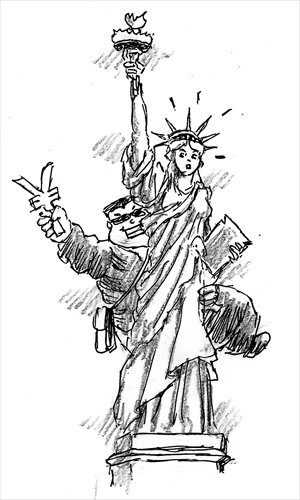With no manners at home, no wonder tourists go rogue

Illustration: Peter C. Espina/GT
They are loud, pushy, unruly and egocentric. They are fond of "intimate contact" with cultural relics, climbing on historic statues to pose hackneyed V-sign for shots and scratching their names on ancient walls. They yell at waiters at restaurants and demanded a refund because the medium rare steak they had ordered oozes a suspicious red liquid. They are the best click bait in media.
This particular group is notorious both at home and abroad. They are called "Chinese tourists." In reality, they only account for a fraction of the 100 million Chinese who go abroad each year. However, they are putting China's image in peril.
Things used to be different when the Chinese mainland had just re-opened its gates less than 40 years ago. Only a small number of mainland Chinese, mostly members of the elite, had the chance or could afford a trip to a foreign land. At that time, they usually gave the impression of being quiet, diligent and reserved, facing a new world.
As the Chinese economy has taken off in recent two decades, many Chinese are getting more wealthy that an overseas adventure no longer costs an arm and a leg. They spent more than 1 trillion yuan ($154.77 billion) in foreign markets in 2014.
When some Chinese step out of the country with happy pockets full of cash, their mind is not as ready as their money. Their rogue behaviors reflect the current Chinese social climate: a lack of liberal education, disregard for norms and rules, and the worship of money.
Not every Chinese is rude. Education usually correlates with manners. This could be why young dropouts, and middle-aged and elder tourists are more inclined to act arrogantly and unruly. They don't speak English, and some are not even fluent in Putonghua. Their knowledge about their destinations, such as customs and laws, is barely existent.
The disregard for rules among many Chinese tourists indicates a lack of the rule of law in China. As competition in all walks of life increases and inequality, as measured by the Gini coefficient, is high, people tend to generate a mind-set that everyone has to look out for their own interest.
Order doesn't matter, and those who can break the rules can reap more profits. Devotion to public good, in many cases, is not paid off. This mind-set is reflected in many of their daily activities: They would rather rush ahead than queue up; at buffets they store food they cannot eat, and leave nothing for anyone else; they ignore the need to tip otherwise underpaid staff, but don't blink at paying a fortune for foreign products.
Chinese tourists are still glowing with the ecstasy of booming wealth. One side effect is money worship, which is reflected among many Chinese tourists who believe they can buy anything and everyone. Money might talk, but bullshit too often walks with it.
The "uncivilized" behaviors of these tourists are actually an extension of China's problematic social ethos. Like "ugly Americans," who won a pejorative reputation due to the country's long-standing exceptionalism and egocentrism, the Chinese tourists will only find their image improved when Chinese society has fixed its problems.
The author is a Global Times reporter. liuzhun@globaltimes.com.cn